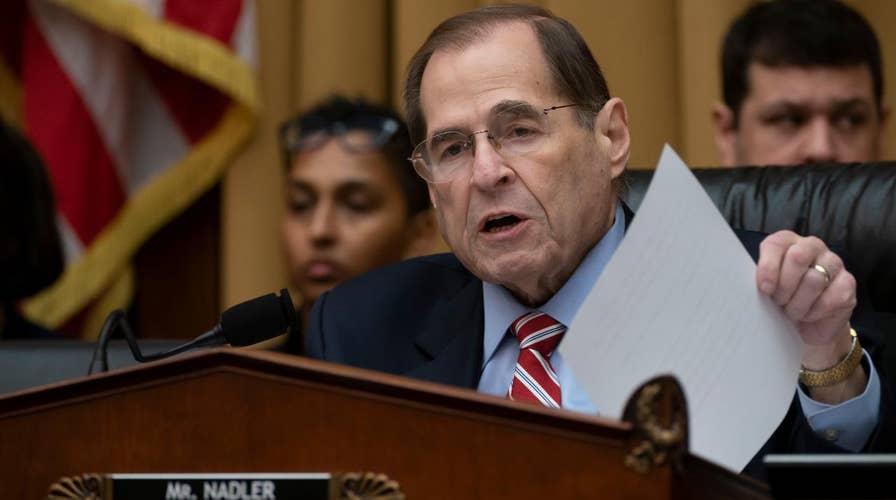Jerry Nadler says he will give Attorney General Barr 'time to change his mind' before issuing subpoenas
The House Judiciary Committee approves subpoenas for the Mueller report; chief congressional correspondent Mike Emanuel reports from Capitol Hill.
House Judiciary Committee Chairman Jerry Nadler is being accused of hypocrisy by Republican critics for moving to subpoena Special Counsel Robert Mueller’s Russia report, as vintage video surfaces from the Clinton days showing him urging caution regarding the release of details from then-Independent Counsel Kenneth Starr's report.
Committee Ranking Member Doug Collins, R-Ga., blasted Nadler, D-N.Y., on Wednesday for voting to authorize subpoenas, noting that in 1998, Nadler sought to protect grand jury material.
HOUSE JUDICIARY COMMITTEE DEMOCRATS AUTHORIZE SUBPOENAS FOR MUELLER REPORT
“But now a different political landscape compels the chairman to adopt new standards of fairness, ignore existing law and demand the material he once considered ‘unfair to release,’” Collins said Wednesday. “As much as the chairman or I may want to view this material, it is a fundamental underpinning of our justice system and law that we cannot.”
Nadler maintains he has been consistent in both cases -- calling in 1998 and the present day for the committee to first review the documents, acknowledging in both cases concerns about the release of grand jury materials to the general public.
"In 1998, the central debate was about the public release of some of the materials accompanying the Starr report — materials that Congress already had, and that described private sexual acts in lurid detail. Congress has no business broadcasting graphic accounts of the president’s sex life. It was inappropriate in 1998. It would be inappropriate today," he said Wednesday.
But Republicans suggest that Nadler was far more concerned about the release of sensitive material during the Clinton days than he is now.
A vintage video, posted by The Washington Examiner this week, shows Nadler doing an interview with Charlie Rose in 1998 discussing how the committee would have to go through documents already obtained to screen out “salacious material” that would be “unfair to release.”
“[Grand jury material]—that is material by law unless contravened by a vote in the House, must be kept secret. Somebody, staff of the Judiciary Committee, perhaps the chairman and ranking minority members of the Judiciary Committee is going to have to go over this material—at least the four or five hundred pages of the report to determine what is fit for release,” Nadler said in 1998.
Today, Nadler acknowledges that “some material will have to be redacted before it’s released to the public to protect ... various rights,” saying that's a judgment the committee can make.
But his focus has been largely on obtaining the full report, plus underlying documents, from the Justice Department immediately -- while stressing the importance of some version of that getting out to the public.
"We — the members of the Judiciary Committee, the House of Representatives and the entire American public — are still waiting to see that report. We will not wait much longer," he wrote in The New York Times. “By offering us his version of events in lieu of the report, the attorney general, a recent political appointee, undermines the work and integrity of the department. He also denies the public the transparency it deserves.”
At issue is Attorney General Bill Barr’s decision to review the more than 300-page Mueller report, with the assistance of the special counsel’s team, to determine which sensitive details should be redacted prior to releasing the report to Congress. Some of that material, the attorney general says, could be grand jury material which is typically kept secret, per U.S. code.
Nadler has argued that the Justice Department is “wrong to try to withhold that information” from the committee.
“Congress is entitled to all of the evidence. This isn’t just my opinion,” Nadler said Wednesday. “It is also a matter of law.”
Republicans charge that Nadler has changed his tune.
“Jerry Nadler was on the opposite side of this, and he thought it was a disgusting terrible thing to even think about giving the Starr report. But now, we should give the Mueller report,” President Trump said in the Oval Office this week.
The president also tweeted that: “In 1998, Rep. Jerry Nadler strongly opposed the release of the Starr Report on Bill Clinton. No information whatsoever would or could be legally released. But with the NO COLLUSION Mueller Report, which the Dems hate, he wants it all. NOTHING WILL EVER SATISFY THEM.”
Nadler rejected the president's claims during the committee meeting Wednesday, where the panel -- on a party-line vote -- authorized subpoenas for the Mueller report.
BARR TO RELEASE MUELLER REPORT TO CONGRESS BY 'MID-APRIL, IF NOT SOONER'
Barr, last month, revealed his summary of the Mueller report, which stated that the special counsel found no evidence of collusion between members of the Trump campaign and the Russians during the 2016 presidential election. The special counsel was also reviewing whether the president had obstructed justice in any way, but ultimately did not come to a conclusion on that issue. Barr and Deputy Attorney General Rod Rosenstein, though, said the evidence was “not sufficient to establish that the President committed an obstruction-of-justice offense.”
Last week, Barr said that he and the special counsel were “well along in the process of identifying and redacting” sensitive material, including material that “by law cannot be made public,” “material the intelligence community identifies as potentially compromising sensitive sources and methods; material that could affect other ongoing matters, including those that the Special Counsel has referred to other Department offices; and information that would unduly infringe on the personal privacy and reputational interests of peripheral third parties.”
Barr vowed to release the report to Congress by mid-April, “if not sooner.”






















